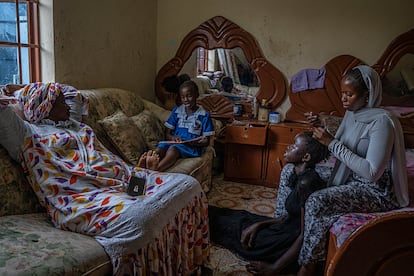A battlefield called the clitoris: A trip to the country threatening to decriminalize female genital mutilation
Gambia is at the center of the global fight to stop women’s rights from being rolled back. Now, a male-dominated Parliament is set to decide whether to overturn the ban on mutilating girls
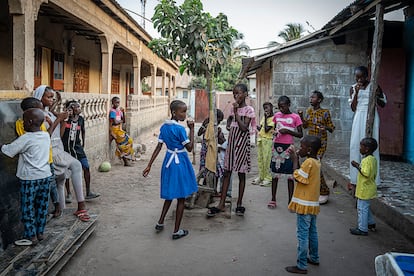

Nine years ago, Serreh lost her mother and inherited a mission. It was the same mission her grandmother had, and it was what she became known for in her small Gambian village, surrounded by mango and cashew trees. Families from her village and beyond came to her home with a specific request. A day was agreed upon and she prepared what was necessary: a concoction that has a “calming” effect for a few minutes, the red clothes that she wore for the occasion and single-use blades. One for each girl, she says. “Many” passed through her hands in the two years she practiced. Most of the girls were under seven years old, sometimes they were babies still being breastfed, and everything happened very quickly, says Serreh, 36. While other women held the girls’ hands and legs, she cut off their clitoris or part of it.
Mutilating the genitals of little girls was Serreh’s role in the community. Tall, dressed in bright orange and with a serious expression, she says that she took on this role in 2015, the year it was banned in Gambia, a small state of 2.7 million inhabitants in West Africa embedded in Senegal. She stopped two years later, in 2017, when she learned how dangerous it was thanks to “radio programs” that reached rural areas like her village. She also knew, because other women had shown her, explaining that what she did caused “complications, especially when giving birth.” Her grandmother supported her: “You are the new generation. If they say it’s bad, you have to stop,” she remembers her saying. By then, four of her five daughters had already been cut.
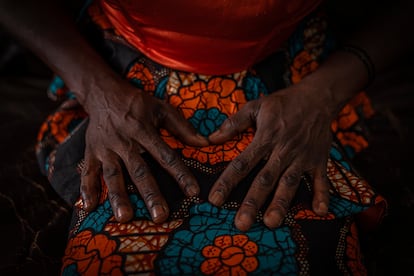
Serreh feels guilty, especially for the eldest, who has just gotten married. “She’s had a lot of problems,” she says, head down, looking at her hands. “Her husband can’t penetrate her, [her vagina] is sealed. We had to go to the hospital to open it again,” she explains. In a country where three out of four women are mutilated, where the majority of adolescents and young women do not know what intact female genitalia look like, hope lies in girls like Serreh’s last daughter. “I’m happy for her, she’s six years old,” says Serreh, who has broken the cycle by joining those who save girls from the pain, trauma and lifelong physical consequences of female genital mutilation (FGM).
But the slow process of transformation that thousands of women have been forging, especially in the last decade — which began to reduce FGM among girls under 15 years of age — is now in danger. Gambia’s Parliament is set to vote on decriminalizing FGM in response to a campaign based on Islam — the majority religion —, rejection of the West, medical fake news and pure misinformation. If the ban is overturned, Gambia will become the first country in the world to roll back protections against the human rights violation that affects 234 million women and is on the rise, according to UNICEF.
Amid the offensive against women’s rights around the world — the crusade against abortion in the West, the impunity for sexual and gender violence — the battle taking place in Gambia may set a precedent for countries where FGM is deeply rooted, such is the case in dozens of countries in Africa, the Middle East and Asia. But it is also symbolic because of the risk it poses to other women’s rights: “If the ban is lifted, the message is that it does not matter what happens to women, because there is no aggression more harmful than taking a little girl and cutting off the most intimate part of her body. The message is that you are not going to protect the most vulnerable,” says Fatou Baldeh, an influential Gambian feminist known around the world for her fight against FGM, of which she is a survivor. “If they manage to repeal the law, they will go after child marriage. They will start marrying girls. In fact, they have already begun to threaten to lower the age of marriage to 13 [from the current 18]. All laws that protect women will be taken away.”
Activists want the law not only to stay, but to be enforced. In the past nine years, no one had been convicted or fined for mutilating the girls, but that changed last August. That month, three women were arrested for performing excisions on eight babies and had to pay 15,000 dalasis, about $203 — a lot of money in Gambia but below the minimum outlined by the law. That incident sparked a surge of support for FGM — which has continued to be practiced in secret (albeit to a lesser extent) — and is at the heart of the campaign to end the ban. Within hours, a well-known imam, Abdoulie Fatty, raised the bail money and the women were released.
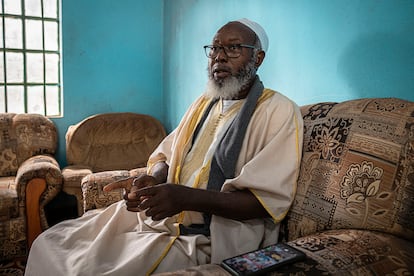
“A little piece” of clitoris
The school that Fatty runs has a huge central courtyard that connects the blue- and indigo- painted buildings, where boys and girls learn the Koran. Some of the girls wear — in addition to the uniform that covers their heads and down to their feet — a black niqab that leaves only their eyes uncovered. It is 9 a.m. and it is already very hot. The imam enters the small, carpeted, half-darkened room with three cell phones in his hand, which he stares at for a long time before deciding to speak. The first thing he says is that he is “totally against FGM.” “Women’s genitals should not be mutilated, there is nothing to discuss, is that clear?” What he advocates, he says, is “female circumcision” which, he says, “Islam recommends.” Experts deny this, arguing it pre-dates Islam, and FGM has been successfully banned in other Muslim countries, such as neighboring Senegal. But it continues to have a strong ethnic and traditional component.
Fatty proposes cutting “a little piece” of the clitoris. “People do not distinguish between FGM and circumcision, that is the problem,” he says, falsely differentiating between the two, since everything is mutilation in the eyes of the World Health Organization (WHO). According to the WHO, FMG negatively impacts women’s health in many ways: pain, bleeding, infections, inability to have sex, trauma and death. Fatty has his own ideas on the matter: “I do not deny that [circumcision] is an operation, albeit a minor one, and therefore carries a risk. People can die because their foot is cut off, or their hand is cut off, or a tooth is removed, yes. But there is no law to prohibit it. If you go to the doctor and he cuts open your belly and you die, nothing happens [there are no legal consequences].”
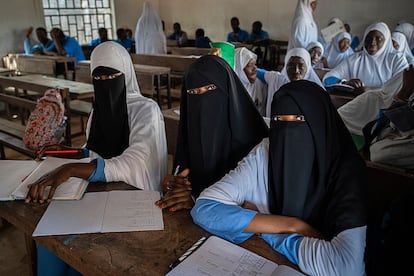
Meanwhile, fake news disguised as religion is triumphing on social media. The goal of the campaign is to present circumcision as a harmless, religiously based procedure that has nothing to do with FGM, and to open a legal avenue for it to be carried out.
Fatty argues that the fact that “women [in Gambia] have 10, 11, 12 children, many more than in Europe” is proof that the procedure is safe, and claims that he has not instigated any campaign to support the ban being overturned. According to Fatty, the only campaign being waged is the one against Gambia’s traditions that has been imported from the West. “Just like homosexuality,” he says, which in Gambia can be punished with prison sentences. “Maybe transgender people will come to us as well,” he laughs in indignation.
Fatty’s most shocking argument, however, is the claim that women’s sexual pleasure will not be affected by circumcision. He says that he sees no problem with it, since “the whole clitoris is not removed,” and, “desire is not in that part alone.”
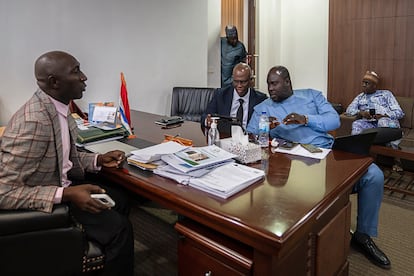
From the outside, Gambia’s National Assembly building in the capital Banjul looks like a stadium. At the entrance, two smiling lions flank a shield above the words “progress, peace, prosperity.” Inspiring ideals for a democracy that was born seven years ago, after two decades of Yahya Jammeh’s dictatorship, a bloody period marked by massacres, sexual violence and hundreds of disappearances. The people who will decide whether or not to modify the law that bans the mutilation of girls’ bodies are nearly all men: there are only five female deputies in the Parliament of 58 representatives.
Only four deputies voted to keep the ban. One of them is Gibbi Mballow. Dressed in a checked jacket, he is meeting in his office with five other parliamentarians from the same political group: the National People’s Party, the ruling group. No one supported his stance against FGM on the day of the first vote. “It is a harmful practice, even though some say it can be medicalized, it has no health benefits,” he says in his deep voice. He also argues that Gambia “cannot be an island: Senegal has banned it, Guinea… neighboring countries have done so. If we repeal the ban, we are encouraging those communities to come and establish a base for the practice here, which is unacceptable.”
Mballow also has personal reasons for being against FGM. One day he was working, and the hospital called him. “Do you know what has happened to your daughter?” he remembers the doctors asking him. They told him: “According to your wife, your mother has taken the girl to a traditional [rite] and she is bleeding. We are trying to stop the bleeding. We need blood.” That’s how he learned that his daughter, then a seven-month-old baby, had been mutilated. And the three oldest ones too. “I can’t go to the police and report my mother,” he says about the complexity of eradicating the deeply rooted practice. “I called her and my wife. We sit down. I told her: ‘You are my mother, but you are not these girls’ mother. Stay away from this practice, never again.’ She was very sad and confused when the little girl had the hemorrhage, she regretted having done it.”
The March 18 vote — when the bill that triggered the process to decriminalize cutting was given the green light — shook the country. It also attracted the attention of Western embassies, international agencies, NGOs and donors unwilling to sponsor human rights rollbacks in a country in need of funding and support, where some 40% of the population is poor, according to the U.N. Development Program.
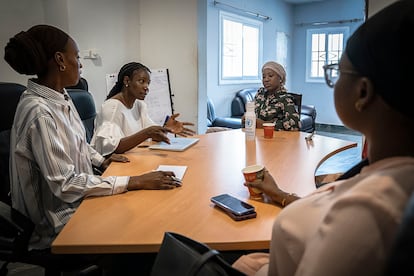
That day, inside the House, Fatou Baldeh and other activists went to protest. “I saw solidarity, I saw power, I saw sisterhood, women supporting women. We went in there to look those men in the face,” she explains. “I remember one got up and said that some of them were crying and that it was uncomfortable. But that’s what we wanted: for them to know that we are there, that we are watching them, that what they are doing is wrong and that they should feel uncomfortable about it,” says Baldeh, who recently went to the White House and to the U.N. headquarters in Geneva to be recognized for her fight against FGM.
Doing whatever it takes for religion
Among the protesters who demonstrated in March were three students from a university that receives funds from Saudi Arabia. But they were there to show their support for decriminalizing FGM. Two are studying to be teachers and another is studying Sharia, Islamic law. They are in the library under many layers of clothing. Aisha, 19, is completely covered: only her eyes and hands can be seen. She says that in Gambia, there is no genital mutilation, “it is circumcision” — a distinction that the imam has popularized. She is vehement: “Even if the law prohibits it, we will do it because our religion allows us to, and if we are fined, we will pay. We will do whatever it takes for our religion.”
Mballow’s daughter has recovered, and he has embarked on a campaign to convince the rest of the deputies to vote to maintain and strengthen the law criminalizing FGM. He says that he has received threats and pressure for his position, as has his family. His stance has made him a target for those who want to decriminalize it or make it an option for families, as if one could choose to legalize violence against women. And this backlash has had an effect on his voter base, in his province, Lower Fulladu West, south of Gambia River that divides the country in two. “It’s as if I were against my people, against those I represent,” he explains.
In the four months before the final vote, the two parliamentary committees will listen to doctors, experts, international organizations, survivors and activists. “Tradition is being confused with religion: Algeria, Morocco, Tunisia, Saudi Arabia…excision is not practiced there. Are they less Muslims because of this?” asks Adriana Kaplan, an anthropologist, who spoke in Parliament about how FGM affects women’s health throughout their lives, particularly during pregnancy, based on two studies carried out in the country.
The organization she heads, Wassu Kafo Gambia, designed the manual that trains doctors on types of FGM, how to prevent it, the risks involved and how to treat complications. “Although they were confronted with the consequences, [the health workers] did not relate the harmful effects to the practice,” she explains at the organization’s headquarters.
There is also debate on the streets and on social media, where the conversation has sparked a kind of #MeToo movement for survivors of FGM. And it’s not just a handful of women who have come out to share their story. “It’s the first time it’s happened in such a general way,” says Jaha Dukureh, one of the best-known activists against FGM.
Dukureh lives in the United States, where she was sent at the age of 15 to marry a much older man. There she discovered that they had performed infibulation, which consists of cutting the clitoris and the labia majora and minora and suturing the vulva and vagina, leaving two openings, one for menstrual blood and the other for urine. It is an extreme type of mutilation, but not unusual. For Dukureh, after her struggle to get out of that marriage, to understand what had been done to her, to study a degree and return to Gambia to promote a ban in 2015 — which ended up being applied by the homophobic and bloodthirsty dictator Jammeh —, the campaign to decriminalize FGM is “very personal.”
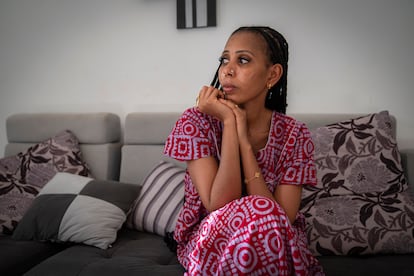
That is why she has returned to Gambia: she wants to help the campaign to stop the bill decriminalizing FGM from being passed. In recent months, she has endured all kinds of attacks: “They threaten my children, they insult me daily, they want me to be raped, they say I am a spy, a foreign agent…,” she says. “In the end, that gets to me, it affects me.” Despite everything, she points out that, also for the first time, “civil society has come together to work for a common good. It is a powerful gesture.”
Breaking the cycle
The Women in Liberation and Leadership (WILL) foundation, created by Fatou Baldeh, is a beautiful oasis with a courtyard in the middle of a street without sidewalks. Inside, the walls have beautiful murals with drawings of baobabs: each one tells the story — from the roots to the branches — of a victim of the Jammeh dictatorship. This is also how, through drawings, they talk about what a vulva is, about sexual consent, about how a pregnancy happens, about the fake news surrounding mutilation and why it continues to be done. “We create safe spaces for teenagers,” says Baldeh.
Thousands have come here to talk, to share doubts, to learn about other people’s experiences. To break the silence and release the trauma. “One of my classmates,” says Baldeh, “found out that she had been mutilated when she became a mother. Nobody tells you. Here we talk to you about your body: mutilation is so frequent that even those who suffer complications do not associate it with being cut, they think it is part of being a woman.”
Aïssatou, 25, lived through that transformation process at WILL, and is now part of the team. She is in college, and explains that before taking the course, she was convinced that most of the beliefs and fallacies about mutilation were true. “My family made me believe that it is a good thing, that if you don’t have it you are dirty, you are not pure, you will have a hard time giving birth [it is exactly the opposite].”
In her town, of the Mandinka ethnic group, which is one of the groups where FGM is most widespread, “they call you an insult, something like ‘not-cut,’ they isolate you,” says Aïssatou, although she says this is happening less and less. At WILL, Aïssatou spends her time talking to teenagers about FGM, but “always from experience: if you haven’t been mutilated, they don’t believe you,” she says.
Aïssatou was cut when she was seven years old and remembers “every detail of it, it was very traumatic.” When she goes to the villages to give the courses, she always starts by talking about other types of sexist violence, such as sexual violence and abuse from husbands, and little by little, she tells them that their body is their own, explains why they do not feel sexual pleasure, and discusses infections. “No one tells them anything, they only talk to them about religion,” she says.
It is not easy to change beliefs that have been so widespread for generations. Fatou faces this task every day as a trainer at the NGO Wassu Kafo. She is a big, smiling, soft-spoken woman. She uses two tools in her campaign to end FGM: “respect,” she says, and her own body, her experience as a mutilated woman. “You can’t show up in a village and tell them not to do it or that they are ignorant, because you’re met with ‘this is my culture and my religion’ and they get angry with you,” she explains on the couch of her home, where he lives with his three daughters and her husband. “It takes time. They are ashamed to talk about it, and it is very difficult for them to believe that the symptoms they have, their difficulties in giving birth, the pain they experience when having sex have anything to do with mutilation.”
Fatou’s two oldest daughters were cut before she knew what she knows today. And she had to turn to the law to defend her 10-years-old girl from suffering the same fate: “My husband is Mandinka. I warned my sisters-in-law that if they touched the girl, they would go to jail.” She is worried about the ban being lifted because it has a deterrent effect that helps her in her work. But a change is already happening. Her little girl, like Serreh’s daughter, are growing up free of mutilation. She is now unknowingly part of a small generation of girls, protected by mutilated mothers, sisters and grandmothers, who have broken the cycle of violence.
